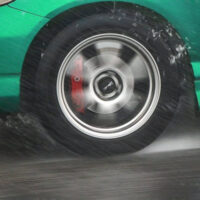Understanding Hydroplaning And Assessing Fault

Wet roads can result in hydroplaning. If you have ever experienced your vehicle sliding uncontrollably, due to your vehicle losing its ability to maintain traction on pavement because it is wet, you are likely hydroplaning, which can be incredibly dangerous and scary. Wet pavement accidents can lead to serious property damage, and injuries are possible.
When you understand what causes hydroplaning, you can take steps to prevent it. And if you have been involved in a collision due to wet conditions, talk to a Miami personal injury lawyer about how fault is assessed after hydroplaning crashes and how you can access the funds you need to recover from a Florida crash.
Treads, Speed, Vehicle Weight, and Road Conditions
Hydroplaning or aquaplaning occurs when a layer of water builds up between the tires of a vehicle and the surface of the road. Because of this water layer, the tires lose traction and a driver may not be able to control the vehicle. It is most common when driving over standing water or during a heavy rain storm.
A variety of factors can contribute to hydroplaning, including:
- Tire tread. The treads of a tire are designed to channel water away from the tire, increasing and maintaining traction. When the tread is worn down, however, the tire is more likely to hydroplane.
- While hydroplaning can happen at any speed, driving too fast for the road conditions can increase the risk of hydroplaning. Because of this, when you are driving on wet roads, it is important to slow down and allow for extra stopping distance.
- Depth of the water on the road. The deeper the water, the more likely it is that a vehicle will hydroplane. Standing water carries an especially high risk of aquaplaning.
- Weight of the vehicle. Heavier vehicles are less likely to hydroplane. Smaller vehicles do not have the same weight that large ones do, and weight can help a car, truck, or bus to keep the tires in contact with the road during inclement weather.
- Conditions of the road. Heavily damaged roadways may have more standing water when there is heavy rain.
If the road conditions were exceptionally poor at the time of a hydroplaning accident, such as broken placement resulting in standing water, the driver may not be found at fault for the collision.
Assessing Fault After a Wet Pavement Accident
Every type of accident has its own factors when it comes to assessing fault. After a hydroplaning accident, driver behavior will be reviewed along with vehicle maintenance, and other factors.
Fault could be shared between a few pirates. Talk to a Miami personal injury lawyer about your situation and what factors will be considered as you move to secure compensation for your accident expenses.
Could the expertise of a skilled attorney lead to a higher settlement to cover the costs of a wet pavement accident? The legal team at Spencer Morgan Law will compassionately listen to the details of your situation and advise you on next steps. Call 305-423-3800 for a confidential assessment.
